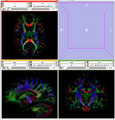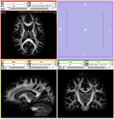Difference between revisions of "2012 Winter Project Week:DWIPhantom"
From NAMIC Wiki
| (One intermediate revision by the same user not shown) | |||
| Line 25: | Line 25: | ||
Our approach is composed of different steps: | Our approach is composed of different steps: | ||
| − | + | * creation of high resolution atlas: | |
| − | + | **6 young adults scanned at 1.5mm3, 42 directions | |
| − | + | **High resolution DWI atlas | |
| − | + | **Full brain filtered two tensor tractography (Millions of fibers) | |
| − | + | * co-registration of structural atlas with shape space: | |
| − | + | **100 healthy (20 in each 18-29, 30-39, 40-49, 50-59, and 60+) | |
| − | + | **Isomap vs (PCA + local mean) | |
| − | + | * creation of "random-sample" phantoms in shape space: | |
| − | + | **Pathology simulation here | |
| − | + | * application to fiber geometry in atlas space | |
| − | + | * creation of DWI with different models: | |
| − | + | **Initial model is CHARMED only | |
| Line 49: | Line 49: | ||
<h3>Progress</h3> | <h3>Progress</h3> | ||
| + | * Debugged my program which create the DWI phantom: | ||
| + | ** Tried to find parameters that fit well with the model we choose for creation of DWI | ||
| + | ** Obtained first results for DWI phantom with corpus callosum that I need to validate and then improve | ||
| + | |||
| + | * Discussed the algorithm we use for tractography comparisons with people I met at the meeting | ||
</div> | </div> | ||
Latest revision as of 15:29, 13 January 2012
Home < 2012 Winter Project Week:DWIPhantom
Contents
Key Investigators
- UNC: Gwendoline Roger, Yundi Shi, Clement Vachet, Martin Styner, Sylvain Gouttard
Objective
Current software phantoms are quite abstract, quite far from human brain. The goal of the project is to create a software phantom that is human brain like for evaluating tractography algorithms. It will allow for simulating pathology, such as tumors, TBI, lesions.
Approach, Plan
Our approach is composed of different steps:
- creation of high resolution atlas:
- 6 young adults scanned at 1.5mm3, 42 directions
- High resolution DWI atlas
- Full brain filtered two tensor tractography (Millions of fibers)
- co-registration of structural atlas with shape space:
- 100 healthy (20 in each 18-29, 30-39, 40-49, 50-59, and 60+)
- Isomap vs (PCA + local mean)
- creation of "random-sample" phantoms in shape space:
- Pathology simulation here
- application to fiber geometry in atlas space
- creation of DWI with different models:
- Initial model is CHARMED only
Progress
- Debugged my program which create the DWI phantom:
- Tried to find parameters that fit well with the model we choose for creation of DWI
- Obtained first results for DWI phantom with corpus callosum that I need to validate and then improve
- Discussed the algorithm we use for tractography comparisons with people I met at the meeting
Delivery Mechanism


